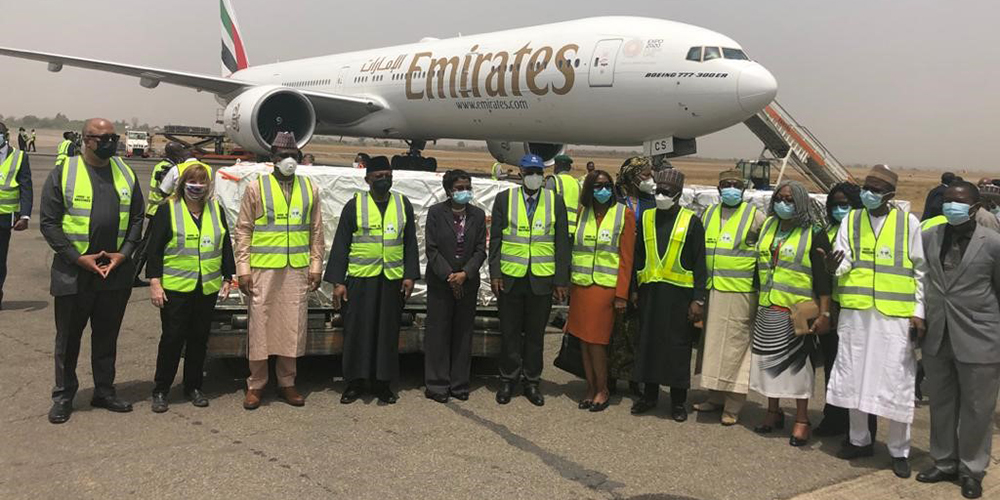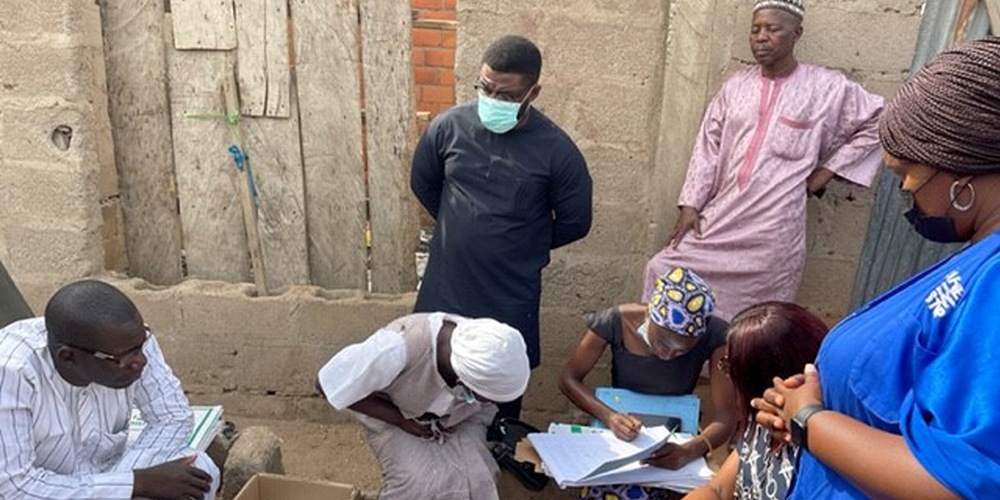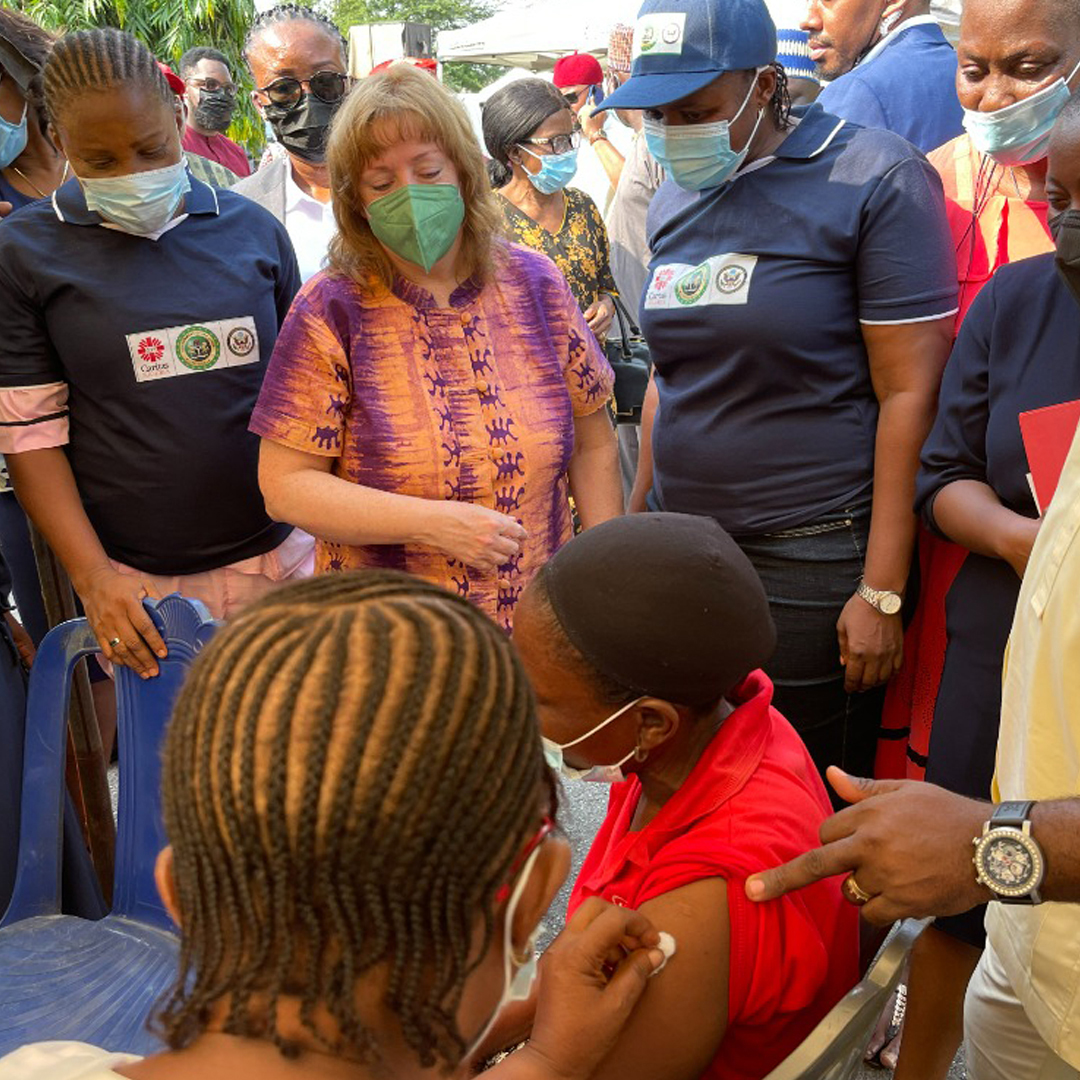CDC Investigates COVID-19 Vaccine Hesitancy and Supports Vaccine Rollout in Nigeria
Summary
- U.S. CDC Nigeria staff conducted several studies to better understand why many Nigerians were not getting vaccinated against COVID-19.
- The studies provided important insight into why people were hesitant to get the vaccine when they were first available. Health officials used this information to build a mass vaccination campaign.
When the COVID-19 pandemic reached Africa, local, national, and international health officials were very concerned about the disease spreading in the continent’s most populated nation, Nigeria, with more than 216 million people. The U.S. Centers for Disease Control and Prevention (U.S. CDC) worked closely with health officials to respond to COVID-19 once it was detected in Nigeria in February 2020.
Getting the First Nigerians Vaccinated Against COVID-19
Nigeria was the third African nation to receive vaccines through COVID-19 Vaccines Global Access (COVAX), a global partnership that provides COVID-19 vaccines to low- and middle-income countries. A shipment of four million doses of the Oxford/AstraZeneca vaccine arrived in Nigeria on March 2, 2021. “This was a turning point for Nigeria, CDC, embassy leadership, and several other agencies who joined Nigeria’s government to receive the vaccines,” says Omotayo Bolu, MD, the U.S. CDC’s global immunization director in Nigeria.

U.S. Embassy Deputy Chief of Mission Kathleen FitzGibbon (2nd from left) and CDC’s Omotayo Bolu, MD, (center in orange) join staff from Nigeria’s Ministry of Health, other government officials, and development partners on the Abuja airport tarmac. They stand in front of the plane that delivered the first COVID-19 vaccines to Nigeria on March 2, 2021. Photo by U.S. CDC Nigeria
Increasing access to COVID-19 vaccines was key to trying to reach the World Health Organization’s (WHO) goals of getting 40% of the world’s population vaccinated by the end of 2021 and 70% vaccinated by mid-2022.
The U.S. CDC worked closely with Nigeria’s government to support their COVID-19 vaccination goals. More vaccines continued to arrive in Nigeria over the next few months including four million doses of the Moderna vaccine provided by the U.S. government. Vaccinating healthcare workers, older adults, and people with weakened immune systems were the top priorities in the first phase of Nigeria’s COVID-19 vaccination plan.
Investigating Vaccine Hesitancy in Nigeria
Five months into Nigeria’s national vaccination campaign, more vaccines were available. However, the number of Nigerians choosing to get the COVID-19 vaccine was low, fueled in part by misinformation circulating in traditional and social media.
Health officials needed to better understand what was keeping people from getting the shots that would protect them from serious illness or death and help end the pandemic.
“We conducted three national studies to understand the low uptake and the effect of COVID-19 vaccines,” says Omotayo Bolu, MD, the U.S. CDC’s global immunization director in Nigeria.
The studies included the following:
- A vaccine hesitancy study between July 26 and August 12, 2021, with nearly 3,500 participants in eight Nigerian states
- A cohort event monitoring study, from September 2021 to March 2022, which followed 12,000 Nigerians to determine the burden of side effects or adverse events following immunization (AEFI)
- A social listening project continues in all 36 states and the Federal Capital Territory. By studying trends and insights on vaccine confidence and hesitancy, researchers can better understand how to help people overcome concerns and become more willing to get vaccinated.
The vaccine hesitancy study revealed:
- Less than half (44%) of those who participated were vaccinated or willing to get the vaccine, mainly because of fear of contracting COVID-19.
- Among the 56% of survey participants who were still unvaccinated, only 10% said they were willing to get the vaccine.
- Lack of confidence in the vaccine ranked highest as the reason for not getting it.
- Fear of possible side effects from the vaccine, mistrust of the government, and not believing that COVID-19 existed were some of other reasons listed for not getting vaccinated.
- Access to vaccines was also a major issue.
Nigeria’s government used these findings to address COVID-19 concerns in national messages. An increase in vaccinations soon followed.
The cohort event monitoring study showed:
- 5,400 people (45%) reported having non-serious side effects and 450 people (4%) reported having a side effect that required medical attention.
- No deaths were recorded.
These results suggest fear of side effects was not a major concern that kept people from getting vaccinated. A second phase of this trial started in April 2022, which includes 18 months of follow up.
“CDC is now supporting an adverse events monitoring surveillance dashboard across the national level and supporting 300 sites across five states,” says Hadley Ikwe, MD, a senior immunization specialist in the U.S. CDC office in Nigeria.
CDC Supports Nigeria’s National COVID-19 Mass Vaccination Campaign
To increase vaccinations, Nigeria launched a national campaign in November 2021. “This was a mass vaccination campaign,” says Ikwe. Everyone ages 18 years and older was eligible to be vaccinated – a total of 112 million Nigerians, almost half of the country’s population.
“As CDC completed the various studies, we realized that we had to support Nigeria’s mass vaccination campaigns at the sub-national level to see an increase in coverage,” says Bolu.
“We started with two states as a proof of concept to support mass vaccination teams. Within three months we saw a 15% to 25% increase in vaccine coverage in these states.“

CDC’s Hadley Ikwe, MD (wearing black) and Omotayo Bolu, MD (sitting, in a dark blue and white dress) and National Stop Transmission of Malaria Program/Africa Field Epidemiology Network team lead Lillian Okeke, MD, (right, in blue outfit) observe the documentation of COVID-19 vaccinations given in a marketplace in Adamawa State in Northern Nigeria. Photo by U.S. CDC Nigeria
CDC encouraged states to use Geographic Information Systems (GIS) to determine where to set up vaccination stations based on population size. It also helped determine how to access to roads, waterways, and health centers. CDC Nigeria Country Director Mary Boyd, MD, along with the U.S. Ambassador to Nigeria, Mary Beth Leonard, and other members of the U.S. Mission supported state governments to ensure their ability to own and sustain their vaccination campaigns.
“By bringing temporary mass vaccination sites to hard-to-reach areas, COVID-19 vaccinations increased dramatically. About 200,000 shots are administered daily but Nigeria needs to at least triple this to achieve set targets,” says Boyd.
- Findings from the vaccine hesitancy study generated evidence for a special COVID-19 Crisis Communication Centre (CRICC).
- Results from the AEFI study revealed that fear of side effects was not a top concern, so CRICC’s targeted messages focused on access, safety, and efficacy.
- Results from the social listening study led to the creation of risk communications that explained how vaccines protect individuals and their families from serious illness or death.
These efforts led to increased demand for vaccines, resulting in more than six million people getting one dose of COVID-19 vaccine in January 2022, more than in any other month of the campaign.
U.S. Government Focuses on Getting COVID-19 Vaccines Into More Arms
In December 2021, the U.S. government announced the Initiative for Global Vaccine Access – Global VAX – “to turn vaccines in vials into vaccinations in arms for eligible populations around the world.” The U.S. CDC’s global vaccine efforts through Global VAX have shifted from vaccine preparedness to implementation, with a focus on planning, improving vaccine confidence and demand, supporting vaccine safety monitoring, and evaluating vaccination programs.
Nigeria’s increased vaccinations have not gone unnoticed. During a media briefing on March 23, 2022, WHO’s Dr. Tedros Adhanom Ghebreyesus told reporters that “in Nigeria, for example, vaccine uptake was dramatically increased when supply stabilized, and planning was done on how to effectively distribute vaccines.”
Boyd says, “Nigeria still has a long way to go. To reach the 70% goal, health officials estimate that 600,000 vaccine doses have to go into arms each day.”
“So, health officials are using information from the CDC’s vaccine hesitancy and social listening studies to create more pro-vaccine messages and share them on social media to convince more Nigerians to get the vaccine,” says Ikwe.

Kathleen FitzGibbon, U.S. Embassy Deputy Chief of Mission (center, in orange-purple shirt) and U.S. CDC Nigeria Country Director Mary Boyd, MD (second from right in black dress) watch a woman get a COVID-19 vaccination in a U.S. government supported facility in Imo State, South-Eastern Nigeria. Photo by Halilu Usman/U.S. CDC Nigeria